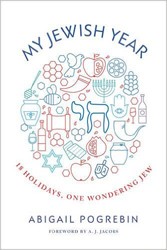Even to the most devout, the Jewish calendar can seem cryptic. Perhaps we know the parables behind the holidays but not how to apply them, or maybe we recognize the Hebrew words composing the prayers but not what they say. Seeking deeper meaning, New York journalist Abigail Pogrebin – a reform Jew whose annual childhood observance covered the High Holidays, Hanukkah, and a couple of Passover seders – decided to embark upon a yearlong journey into understanding Judaism through 18 holidays.
Based on her column for The Forward, called “18 Holidays; One Wondering Jew,” the book chronicles Pogrebin’s adventures in Judaism, from Elul, the period of reflection that precedes Rosh Hashanah, to the final Shabbat of the year. Pogrebin logged her thoughts, feelings, and experiences in detail while interviewing dozens of rabbis and Jewish academics on the Torah and observing the holidays at synagogues of all denominations across New York and Los Angeles.Though it required uncomfortable tasks such as wrestling with an unwieldy shofar for a month and enduring multiple fasts, the calendar proved a tidy framework for discovering the fullness of the religion. “The Jewish schedule heightened the stakes,” Pogrebin writes, “reminding me repeatedly how precarious life is, how impatient our tradition is with complacency, how obligated we are to rescue those with less, how lucky we are to have so much history, so much family, so much food.”
The book provides intimate access to Pogrebin’s extensive Rolodex of rabbis and Jewish thought leaders, cultivated through decades of work as a journalist and through her family’s robust network of friends. (Mother Letty Cottin Pogrebin is a well-known activist who started Ms. Magazine with Gloria Steinem; twin sister Robin is a longtime reporter at The New York Times.) The narrative, interspersed with analysis and musings from renowned Jewish scholars, is sufficiently accessible to compel a reader to explore the depths of his or her own faith, no matter how devout or secular. Throughout, Pogrebin draws insight from Judaism’s Orthodox, Conservative, and Reform branches, underscoring that such diversity of thought has never been more necessary, as 21st century social movements seem to deepen the divide within the religion.
But Pogrebin also learned that Judaism has the power to unite. Conga dancing with the Torah during a Simchat Torah celebration, she begins to regard Judaism as a vehicle for connection. “Where in the world is there a people that loves a book so much that they dance around with it?” The Jewish Learning Center’s Rabbi David Kalb asks her. “It’s a celebration of the biggest book club in the world.”
Pogrebin credits the year of study with making her more mindful, compelling her to “look harder at every priority, every relationship, every choice,” and quelling her concern that it’s too late to start living a Jewish life. Instead, she happily discovers that “Judaism is a train that circles back to pick you up.”


